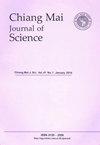中国南方白粉病真菌白粉病的研究
IF 0.8
4区 综合性期刊
Q3 MULTIDISCIPLINARY SCIENCES
引用次数: 0
摘要
本研究于2020年和2021年冬夏在广州白云山公园采集具有典型白粉病症状的凯撒草叶片。根据内部转录间隔区(ITS)和rDNA大亚基区(LSU)的形态和分子序列分析,确定病原菌为槲皮Erysiphe quercicola。提供了病原体的描述和相关显微图像。据我们所知,这是首次报道槲寄生寄生在白叶百合上,扩大了槲寄生的寄主范围。此外,我们还提供了真菌的生命周期和地理分布的细节。本文章由计算机程序翻译,如有差异,请以英文原文为准。
Addition to Erysiphe quercicola, A Powdery Mildew Fungus on Urena lobata in South China
Leaves of Caesar weed (Urena lobata) with typical powdery mildew symptoms were collected from Baiyun Mountain Park in Guangzhou, China during winter and summer in 2020 and 2021. Based on the morphology and molecular sequence analyses of Internal Transcribed Spacer (ITS) and large subunit (LSU) rDNA region, the causative agent was identified as Erysiphe quercicola. A description and relevant microscopic images of the pathogen are provided. According to our knowledge, this is the first report of E. quercicola on Urena lobata and this study expands the host range of E. quercicola. Further, we provided details of life cycle and geographical distribution of the fungus.
求助全文
通过发布文献求助,成功后即可免费获取论文全文。
去求助
来源期刊

Chiang Mai Journal of Science
MULTIDISCIPLINARY SCIENCES-
CiteScore
1.00
自引率
25.00%
发文量
103
审稿时长
3 months
期刊介绍:
The Chiang Mai Journal of Science is an international English language peer-reviewed journal which is published in open access electronic format 6 times a year in January, March, May, July, September and November by the Faculty of Science, Chiang Mai University. Manuscripts in most areas of science are welcomed except in areas such as agriculture, engineering and medical science which are outside the scope of the Journal. Currently, we focus on manuscripts in biology, chemistry, physics, materials science and environmental science. Papers in mathematics statistics and computer science are also included but should be of an applied nature rather than purely theoretical. Manuscripts describing experiments on humans or animals are required to provide proof that all experiments have been carried out according to the ethical regulations of the respective institutional and/or governmental authorities and this should be clearly stated in the manuscript itself. The Editor reserves the right to reject manuscripts that fail to do so.
 求助内容:
求助内容: 应助结果提醒方式:
应助结果提醒方式:


